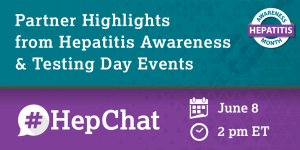
Join Hep B United, the National Viral Hepatitis Roundtable, NASTAD and CDC’s Division of Viral Hepatitis for a Twitter #HepChat at 2 p.m. (EST) Thursday, June 8. The chat will highlight Hepatitis Awareness Month outreach events and allow hepatitis B and C partner organizations to share their successes, challenges and lessons learned from their efforts.

